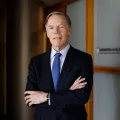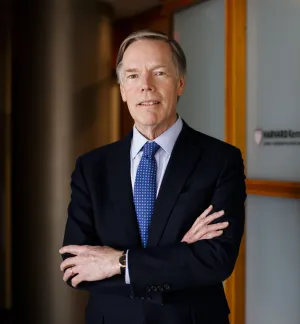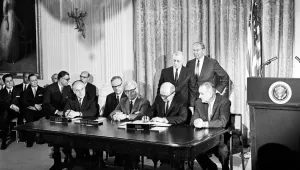The John Courtney Murray, S.J. Lecture
New York City
November 13, 2019
FULL SPEECH:
Ladies and Gentlemen, I am honored to be with you this evening.
I am especially honored to have received this kind invitation to speak by someone I admire very much, Father Matt Malone of America Magazine.
Matt and I share New England roots, a deep admiration for Robert Kennedy, and an abiding faith in the superiority of the Boston Red Sox. I salute his willingness to live permanently behind enemy lines here in New York as a representative of Red Sox Nation.
I am also honored to be with so many members of the Jesuit order and to deliver the John Courtney Murray, S.J. lecture. He, of course, is the Jesuit priest whose scholarship was path-breaking on a topic central to the history of America—the relationship between Church and State.
I want to speak tonight about a subject that is central to the mission of the Jesuits and one that Murray would have deemed essential—restoring a sense of moral purpose to our government at a difficult time in our history.
Let me start, however, by saying how truly grateful I am to the Jesuit Order.
When I arrived at Boston College in September 1974 as a callow 18-year old, I had only a vague idea of what the Jesuits stood for.
But after Freshman English with Father Phil Chmielski, sophomore American History with Father Thomas Grey, and my senior year French Literature class with Father J.D. Gauthier, Père Gauthier as we called him affectionately, I began to understand what the Jesuits were all about—the deep commitment to education, the unflagging academic rigor, and the insistence on ethics to guide the order, each Jesuit priest, and society beyond.
Our Jesuit Professors insisted, as well, that we also reach beyond pure academic enlightenment. They asked us to consider what each of us could do to make ours a stronger and better society. How could we, even in small and imperceptible ways, help to lift up the human condition? BC’s charge to all of its students—men and women in service to others—should be at the center of our ambitions, they said, for the future.
I don’t claim this evening to be anywhere close to an embodiment of these virtues. But, I drank all the Jesuit cool aid as a college student, and happily so. Two of our three daughters are BC grads. They have been inspired by that same sense that our lives can’t be just about our personal good fortune. The Jesuit command is to do what each of us can to elevate our community, our region, our nation, and the world.
Boston College, where Matt and I now serve on the Board of Trustees, has also had the good fortune of being led, for the last 47 years, by just two Presidents. Both have given us master class lessons in leadership.
The late Father Donald Monan saved BC from bankruptcy and put it on the path to recovery in the 1970s, 1980s, and into the 1990s through quiet skill, determination and confidence.
For the last 23 years, BC has benefited immensely from the insightful, steady, and purposeful leadership of Father William Leahy. He has been a transformational leader. Our academic base has strengthened considerably. Our alumni are enthusiastic about the school’s direction. Father Leahy has worked hard to ensure BC retains the Catholic nature of the school. Our students volunteer in record numbers for service projects.
All this is a tribute to the Jesuit Order, its vast network of high schools and colleges around the world and, most especially, to its central message—of service to the world.
I wanted to thank all of you who are in the Jesuit Order this evening for the many gifts you have given to the Catholic Church.
Just as students at universities like BC need a moral compass to guide them forward, the same is true of nations.
The United States, in this sense, is a unique and even revolutionary nation in the world.
We are the only nation born and structured on a set of ideas—about liberty and human freedom.
The foundation stones of our country are among the most revolutionary documents ever written—the Declaration of Independence, the Constitution, and the Bill of Rights.
Our entire history since the 18th century has been to live up to the true meaning of the words towards “a more perfect union.”
That goal has been a continuous and often difficult journey for the American people.
The legacy of race, for example, is not just part of the past but, unfortunately, is all too present now.
A few years ago, I had a fascinating discussion with the filmmaker and poet chronicler of American history, Ken Burns. He told me the great majority of his films about America involve, in one way or another, the issue of race as an active agent in the national bloodstream.
We all know our history.
Our Constitution consigned African-Americans to be considered as three-fifths of a citizen.
The Harvard historian Jill Lepore, in her magnificent one-volume history of the U.S., These Truths, described it this way: “Liberty and slavery became the American Cain and Abel,” she wrote, from the very start of our national story.
She reminds us that while the American Revolution freed white men from the tyranny of empire, it decidedly did not free the slaves and did not accord to women the rights of men.
One way to read our history is to view it as a struggle not just to form a more perfect union but a more moral union.
The most critical event in our history—the Confederacy’s rebellion against the Union—was centered on race and slavery. We lost more soldiers in that one five-year period from 1860 to 1865 than in all our other wars together. Statistically, nearly every family in the country lost a loved one.
When Lincoln issued the Emancipation Proclamation on New Year’s Day 1863, delirious crowds welcomed it on Boston Common and in cities and towns across the north.
But, it then took one hundred years before the promise of liberty was made real in the Civil Rights and Voting Rights Acts of 1964 and 1965.
And, even after the historic election of Barack Obama in 2008, we have unfortunately and tragically seen the return of race, racial bias, and discrimination to plague our national life, even from the White House itself. What else can one conclude after Charlottesville, after the repeated shootings of unarmed African-American men by law enforcement authorities, the open racism of some at the Trump rallies, and the racism of President Trump himself?
Our search for a more perfect and moral union must include the LGBT community, women, Moslem Americans, and all who are persecuted due to their ethnicity, race, religion, gender, or color. That is the great struggle in our history.
We Catholics are not immune from these challenges. I continue to wonder, for example, why my two cousins, Sisters Maureen and Cathleen Toomey, both in religious orders since the late 1950s, both still hard at work for the Catholic Church in their eighties, cannot take their place alongside men on the altar as equals.
The moral of this long, circuitous and often perplexing story is that a nation can only be effective in its foreign policy if it is grounded at home— stable socially, self-confident, and united in its foundational values.
As we take a good and frank look at ourselves on the eve of the critical year of 2020, we should determine that shoring up our democracy at home, addressing the core issues of race, income inequality, and social and political divisions—red/blue, conservative/liberal, North/South/ rural/urban—must be our major priority.
In other words, we need to get our domestic house in order with Lincoln’s warning of the perils of a "house divided" at the forefront of our national debate.
This is a critical point— for us all— to think about, talk about, worry about, and do something about.
As we look overseas, there is much to mend as well.
We know that America remains the single most powerful and influential country in the world. Our military, political, economic, and cultural influence is second to none. I don’t expect that to change for a decade or two or more.
I continue to believe that our destiny is to be a beacon to the rest of the world. We are far from that now, in November of 2019. But that does not mean that we should give up on encouraging the growth of trees of liberty and democracy in lands beyond our own.
We’ve struggled throughout our history to set a consistent course in relating to the rest of the world. Specifically, we’ve been inconsistent in fulfilling the hopes of some of our Founders that we could, as the Jesuits would say, light the world.
Jefferson saw America’s agrarian democracy as an example to others in an age of empire.
But, Washington warned of entangling alliances.
John Quincy Adams agreed with Washington and said of America that “she goes not abroad in search of monsters to destroy.”
A few decades later, however, Lincoln described America as “the last, best hope of mankind.”
Teddy Roosevelt willed us to become a global power at the start of the twentieth century.
But Woodrow Wilson could not convince the Senate to ratify the League of Nations Treaty after the First World War .
As isolation set in for two long decades following World War One, we chose not to be present to challenge Hitler and Mussolini before it was too late in 1939. The consequences were catastrophic—60 million dead in the greatest mass killing in history.
Beginning in President Franklin Delano Roosevelt’s third term in 1940, however, we managed, with his extraordinary leadership, to close the divisions in our country.
FDR aligned with Churchill during the Battle of Britain when the democracies truly had their backs to the wall.
He and 16 million Americans in uniform, men and women, then carried us to victory with our allies.
Our postwar leaders, Republican and Democrat, shared a visionary insight—that America could only protect our interests at home if we, for the first time in our history, entered into alliances abroad and worked with other countries in common purpose.
They resolved never to return to isolation but to engage permanently in the world beyond our shores.
America surely did not get everything right after 1945. Vietnam, our support of right-wing dictatorships during the Cold War, the invasion of Iraq in 2003, Abu Ghraib and Guantanamo are examples of when we actually got it terribly wrong.
But, for the most part, in creating a free and rules-centered liberal order, in defending democracy against the Soviet threat, in helping to unify Germany to support a whole and free Europe, in providing billions in assistance to improve food production and to eradicate disease, we got many more things right.
There was a moral basis to America in the Truman Doctrine’s pledge to defend democracies against communism; in JFK’s challenge to authoritarians: “Let them come to Berlin;” in Reagan’s call to “Tear down this wall;” in George H.W. Bush forging of a free, united Europe after the fall of the Soviet Union; in George W. Bush and Barack Obama’s expansion of NATO so that all the former communist states of Eastern Europe could be finally free from the Russian bear.
That America, our America, is still there.
Just look at the recent opinion polls and the ranks of both Republicans and Democrats in the Congress. The American people and our representatives support our Alliances such as NATO. They are in favor of trading with the rest of the world. They support legal immigration, refugees, and support for democracy worldwide.
But, in the last two and one half years of the Trump presidency, we have lost the moral anchor to our society and government that Father John Courtney Murray believed was so vital for our government and country.
Who can argue otherwise when we reflect on all we have lost and all we have not done since Donald Trump came to office.
Under his leadership, we are failing to act on the greatest challenge of our time—climate change.
In zeroing out all aid to the Palestinian people in the West Bank and Gaza and to the Palestinian refugees, we are failing and losing credibility in the Middle East. I saw this with my own eyes last week in East Jerusalem and the West Bank.
In slashing the number of immigrants to our shores in our immigrant nation and in taking in only 19,000 refugees this year when we were expected to accept over 70,000, we are failing the largest number of refugees in the world since 1945.
In choosing not to stand up for democracy in Hungary, Poland, Turkey, and Hong Kong, we are failing to lead when others truly count on us to do so.
When President Trump is removed from office after a trial in the Senate, or, more likely, at the polls one year from now, we will need to rebuild a shattered State Department, a dispirited FBI and Justice Department, the CIA, and the many global multilateral organizations that have suffered without American leadership.
We will need to launch the greatest reclamation projection in modern American history after the deliberate weakening of our government and its moral foundations in the Age of Trump.
History has not stopped during the last two and a half years.
The world misses the strength, constancy, and even the self-confidence of the United States.
And, the world is changing. Many of the greatest challenges we face cannot be resolved by one nation, even one as powerful as our own, acting alone.
We must face the reality that, for the first time in human history, the fate of all 7.6 billion of us in 195 countries is now linked—through climate change, the threat of pandemics, the power of the drug and crime cartels, and cyber challenges that abound in the 21st century.
We can only succeed in facing all these problems when we act in concert with others.
The greatest imperative, however, is to overcome the moral limitations of this presidency. Among all of his speeches and nonstop tweets, you will not find a single noble, far-reaching goal that challenges America to be at its very best.
It is not impossible to imagine a very different future well beyond Trump’s crude and caustic tweets, his divisiveness, and persistent incivility. We are still capable of choosing women and men in both parties who can lead us back to what we know we must be.
We need desperately to lift our sights and to remember that, until very recently we were led by people of character such as Barack Obama and George W. Bush.
Here is one example of what we could aspire to in a post-Trump world.
When I was growing up outside of Boston in the 1960s and 70s, politicians left, right and center, Democrats, and Republicans told voters they would bring them “peace.”
Peace was considered the highest achievement to which our society could aspire.
In recent decades, politicians of both parties have generally campaigned on the promise of security which is understandable after 9/11.
But, the word “peace” seems to have disappeared from the lexicon of those who campaign for office in America these days.
Can it really be that we have such little hope for a truly better future?
Our greatest modern leaders—FDR on the Depression and war, Truman and Eisenhower on the Cold War, Lyndon Johnson and, especially, the Reverend Dr. Martin Luther King, Jr., on race and civil rights, challenged us to do great things in the world.
And there is so much we can do if we permit ourselves to dream in bigger and more ambitious ways. Here are some examples of how much more we can do to create a world of peace:
- More than a billion people have been lifted out of poverty in the last four decades. We can double that number between now and 2050;
- We can eradicate polio and malaria and save hundreds of thousands of lives in the next decade;
- We can extend to women and people of color the rights and opportunities they have been denied for most of our history;
- We can create a carbon-free America by 2050, but only if we start now;
- We can actually dream of a more just world if we are bold enough to commit to what President Kennedy called for at the American University in 1963 following the near miss of the Cuban Missile Crisis—“A strategy for peace.”
The 19th century English poet, Alfred, Lord Tennyson, was such a visionary when he wrote: “Come my friends, tis not too late to seek a newer world.
Why can’t we build a newer world? A more peaceful world?
It will require, of course, enlightened leadership in the White House and Congress, in union halls, corporations, small businesses, universities, hospitals, and churches, synagogues, mosques, and temples.
There is another America out there.
The America we must build.
A renewed America inspired by the ideals the Jesuit Order has always held high.
An America devoted to justice and civility at home and peace in the world.
Thank you.
Burns, Nicholas. “Our Future: The Pursuit of a ‘Newer World’.” November 13, 2019




